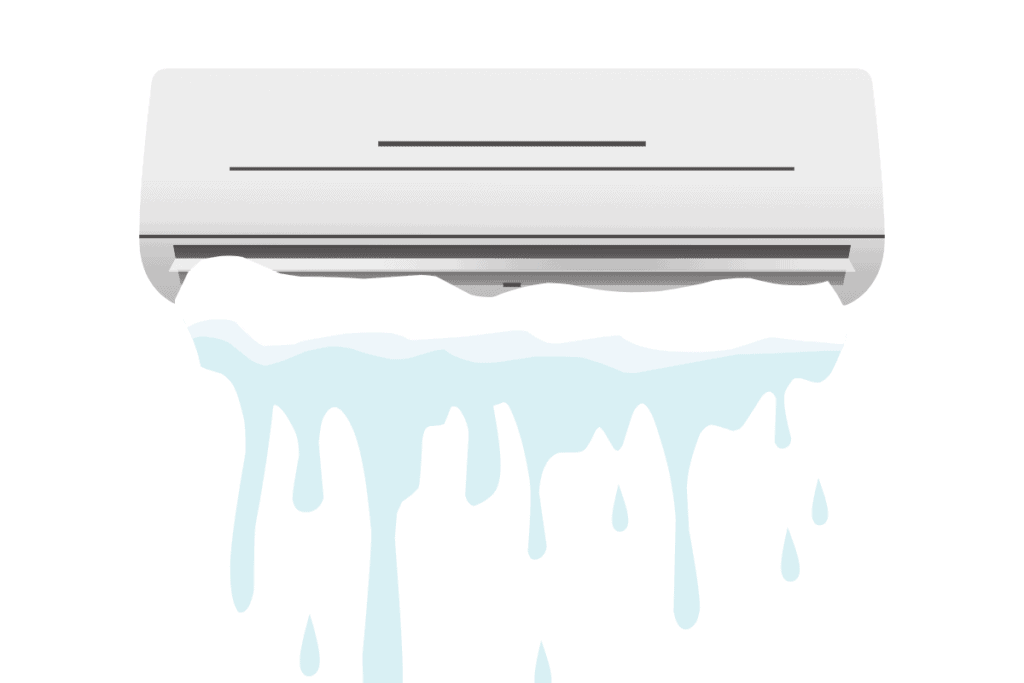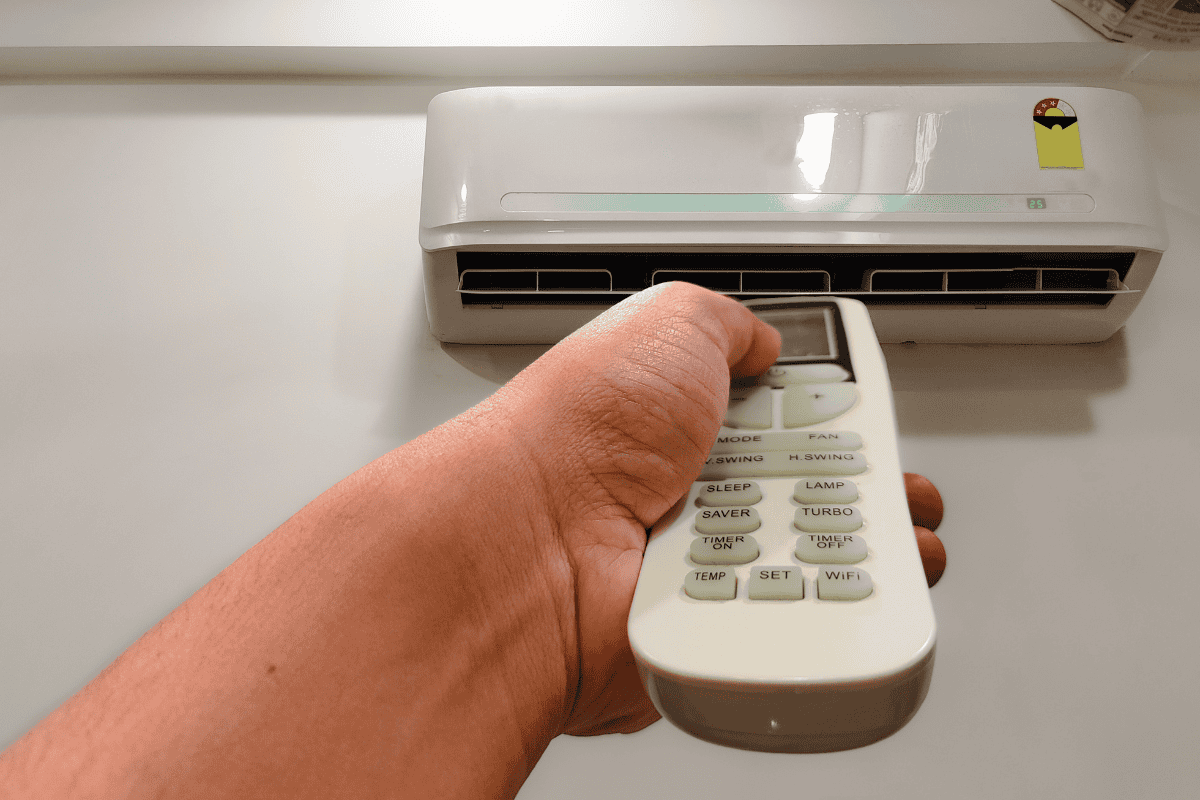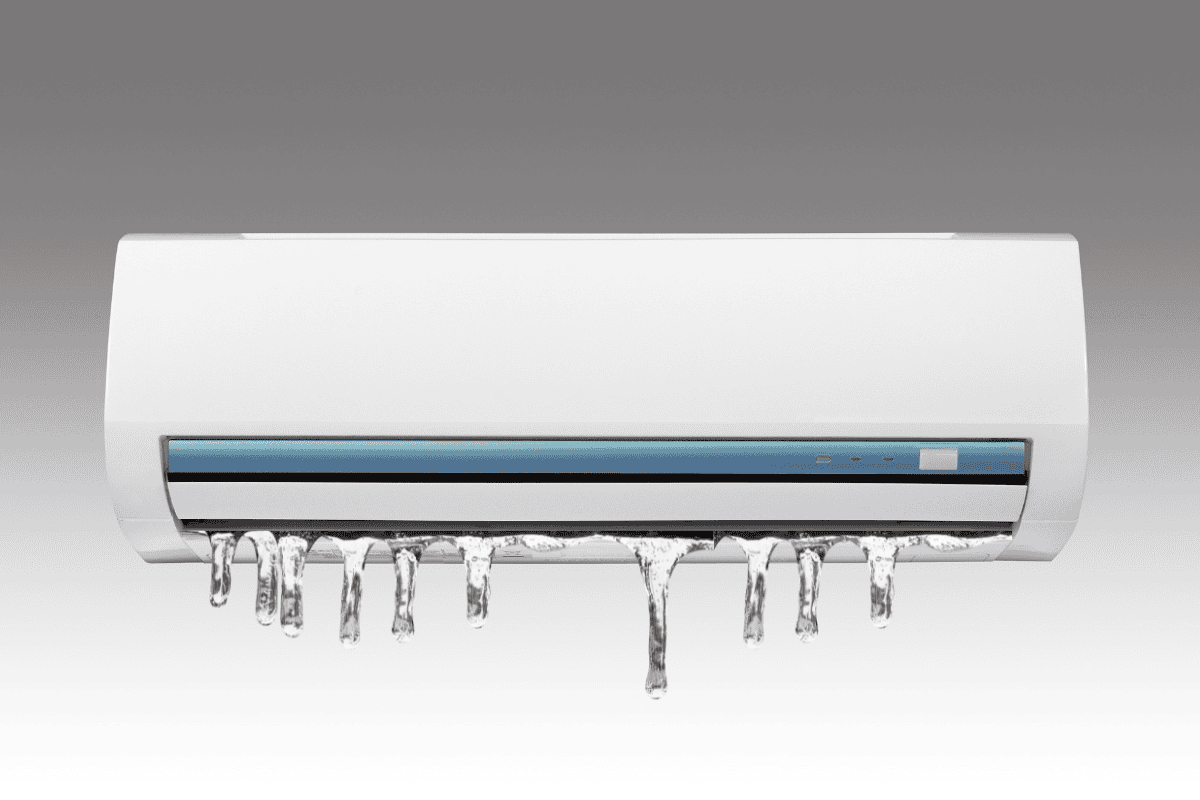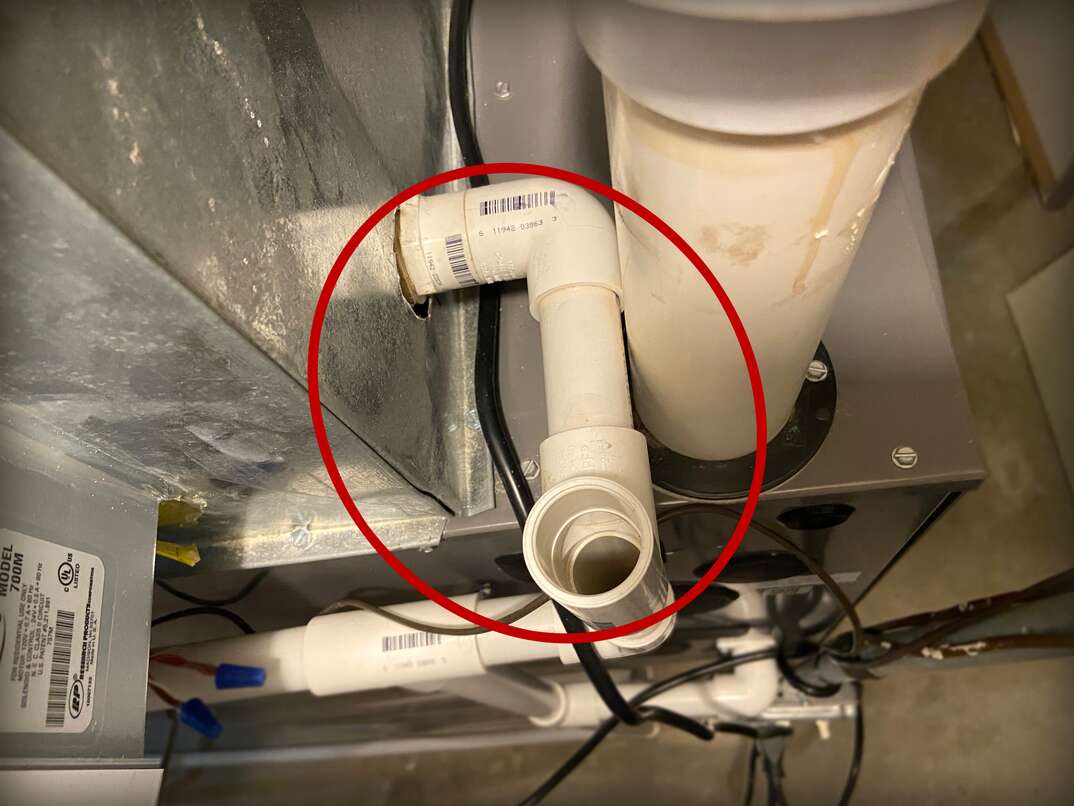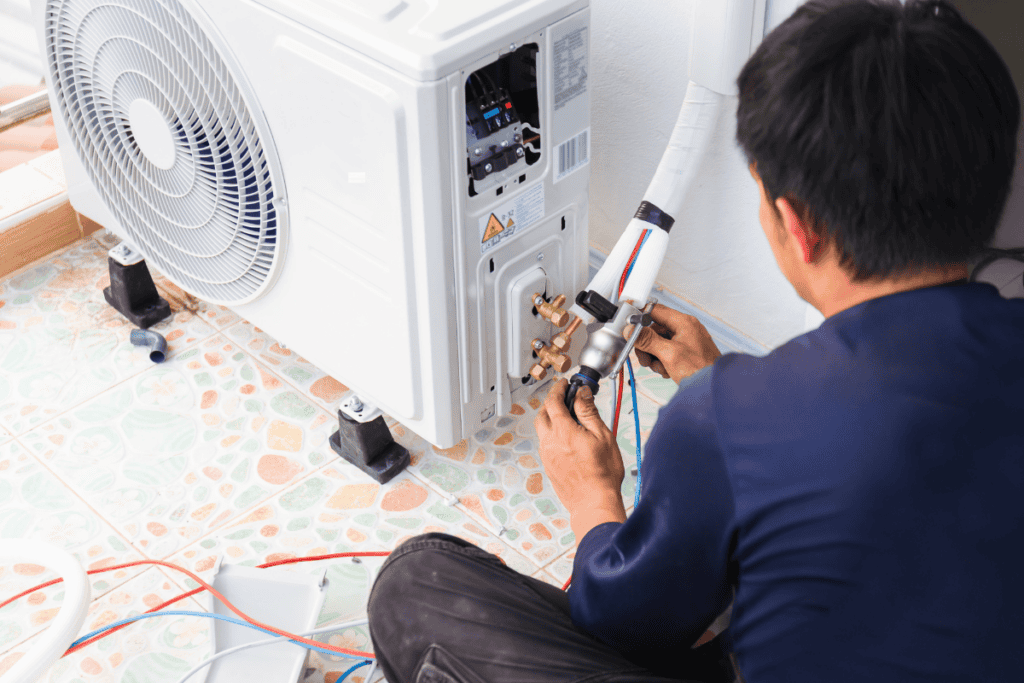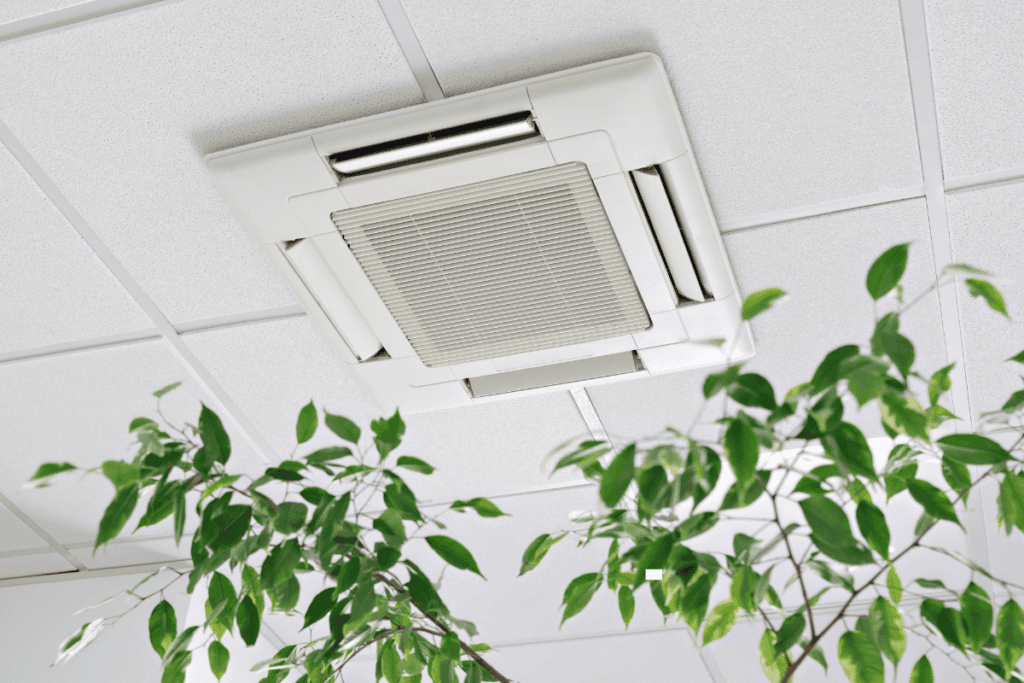Did you know the idea of AC came from blocks of ice? During the 19th century, bouts of yellow fever and malaria were prevailing in warmer regions of the United States, like Florida. At that time, large blocks of ice were shipped from northern states, to use in hospital rooms and give comfort to patients. Wealthy families would also use ice in their homes to keep cool.
Fast forward to the present day, and air conditioning has become a core part of our daily lives. But what happens when your AC unit goes back in time to freeze up and become a block of ice.
A frozen air conditioner can prevent your system from effectively cooling your space, and it’s a frustrating issue that many homeowners face. When the temperature inside your AC unit drops below 60°F, moisture in the air can begin to freeze on the coils, leading to a buildup of ice that hinders your system’s performance.
But don’t sweat it – we’ve got you covered! In this step-by-step guide, we’ll walk you through the process of defrosting your AC unit and getting it back to cooling your home’s air as intended. We’ll explore the most common causes of a frozen air conditioner and provide you with the tools and knowledge you need to tackle this problem head-on.
Contents
- 1 Method 1: Steps to Unfreeze Your AC Unit
- 2 Method 2: Use Some Heat
- 3 Signs Your Air Conditioner Is Frozen
- 4 Common Causes of a Frozen Air Conditioning Unit
- 5 Preventive Measures to Avoid A Frozen AC
- 6 How Long Will It Take To Defrost My AC System?
- 7 When Should You Call HVAC Angel for Help?
- 8 Frequently Asked Questions(FAQs)
Method 1: Steps to Unfreeze Your AC Unit
1. Turn off the thermostat
Turn off your AC unit at the thermostat to prevent the compressor from running and allow the system to defrost.
2. Switch the fan ON
Set your thermostat to “fan only” mode, which will help circulate hot air around the frozen coils and speed up the melting process. Keep the fan running until the ice has completely melted.
3. Figure Out The Source Of The Problem
Investigate the cause of your frozen AC unit, such as a dirty air filter, low refrigerant levels, or a malfunctioning blower motor.
4. Switch the system on
Once the ice has fully thawed and you’ve addressed the underlying issue, turn your AC unit back on and check that it’s blowing cold air properly. Keep an eye on the unit to monitor the performance.
Method 2: Use Some Heat
Other method to unfreeze your ac unit fast is to use a hairdryer to blow warm air on the frozen coils. Hold the hairdryer about a foot away from the coils and use the lowest heat setting to avoid damaging the components. Excessive heat can warp and crack the coils, so be cautious.
Before attempting to unfreeze an air conditioner, make sure to turn off the AC unit to prevent potential electrical damage. Exercise extreme caution when using a hairdryer around leaking liquids to avoid any safety hazards.
By applying a gentle amount of heat to the frozen coils, you can help speed up the thawing process and get your AC unit back to functioning properly.
Signs Your Air Conditioner Is Frozen
1. AC blows warm air
If your air conditioner is blowing hot air instead of cold, it could be a sign that your AC unit is frozen. When the coils are covered in ice, they can’t effectively cool the air passing through, resulting in warm air coming from your vents.
2. Your electricity bill is higher than usual
An iced up AC unit has to work harder to cool your home, which can lead to increased energy consumption and higher electricity bills. If you notice a sudden spike in your energy costs, it’s worth checking your air conditioner for signs of freezing.
3. Water leaking around the AC
As the ice on your frozen AC unit begins to thaw, it can cause water to leak around the base of the unit. If you notice puddles of water near your air conditioner, it could indicate that your system is frozen and needs attention.
4. Hissing or bubbling noise
If you hear unusual hissing or bubbling sounds coming from your AC unit, it could be a sign of a refrigerant leak, which can cause your system to freeze up. These noises occur when the refrigerant escapes through small holes or cracks in the coils.
5. Condensation and moisture around the air handler
Excess moisture and condensation around your air handler can indicate that your AC unit is frozen, signaling that the air conditioner doesn’t get enough warm air circulation. As the ice melts, it can create a buildup of moisture in and around the air handler, which can lead to water damage and mold growth if left unchecked.
6. AC coils are wrapped in ice
One of the most obvious signs of a frozen AC unit is the presence of ice on the evaporator coils. If you can see a thick layer of ice covering the coils inside your air conditioner, it’s a clear indication that your system is frozen and it’s time to let your unit to thaw.
7. Ice is visible on the AC unit
In some cases, you may be able to see ice forming on the outside of your AC unit, particularly around the refrigerant lines or the outdoor compressor. This external ice buildup is another sign that your air conditioner is frozen and requires attention.
Common Causes of a Frozen Air Conditioning Unit
1. Low Refrigerant Levels
When refrigerant levels fall below the needed amount (2-4 pounds), it throws off the balance and causes your air conditioner to freeze. When recharging your unit, it’s a good idea to switch to the current HVAC industry refrigerant, R-410A, which has a lower Global Warming Potential (GWP) compared to older refrigerants.
According to EPA, this will not only help your air conditioner run more efficiently but also contribute to reducing your carbon footprint.
2. Poor Airflow
Air filters should be changed every 90 days to maintain proper airflow and extend the life of your AC unit. Not only can a dirty filter lead to a frozen unit, but it can also negatively impact your home’s air quality.
The Environmental Protection Agency (EPA) states that HVAC filters play a crucial role in maintaining good indoor air quality by filtering out pollutants and contaminants.
3. Wrong Thermostat Settings
The Department of Energy suggests setting your thermostat to 78°F during summer for optimal cooling and energy efficiency. In addition to that, the DOE and Energy Star together also recommend increasing your ideal temperature by 4°F when you’re asleep and 7°F when no one is home to save energy.
4. Evaporator Coil Clogged Up
The evaporator coil, located in the indoor unit of your AC system, is responsible for absorbing heat from the air inside your home. A clogged evaporator coil can lead to freezing and reduced cooling efficiency.
5. Damaged or Broken Blower Fan
The blower fan pulls warm air from inside your home and pushes out cool air from your AC unit. A damaged blower fan can lead to moisture buildup in the unit, causing it to freeze up.
6. Blocked Vent Returns and Registers
Shutting more than one-fourth of your home’s supply registers can unintentionally restrict airflow and cause the AC unit to freeze. Avoid closing too many vents to maintain proper airflow throughout your HVAC system.
7. Drainage Problems
The drain pipe, usually a 1-inch PVC pipe, can become clogged, leading to water leakage, low airflow, strange noises, and increased humidity in your home. These signs indicate a blocked drain that needs attention.
8. Problem With Air Ducts
Clogged or damaged air ducts can restrict airflow into your AC system, causing it to become overloaded and freeze up. Ducts can become clogged due to dust or other particles like twigs and require periodic cleaning.
9. Compressor Is Freezing Up
A frozen compressor can be caused by a clogged filter, insufficient refrigerant, or a broken expansion valve. When the compressor freezes, the AC unit stops functioning and can lead to further freezing of the entire system.
Preventive Measures to Avoid A Frozen AC
To prevent your AC unit from freezing up, there are several preventive measures you can take to let your air conditioning system run smoothly. Here are some key steps to avoid a frozen AC:
1. Check Refrigerant Levels
Regularly inspect your AC’s refrigerant levels to make sure they are within the proper range. Low refrigerant levels can cause your air conditioner to freeze.
2. Clean or Replace Your Air Filter
A dirty air filter can restrict airflow and cause your AC unit to freeze. The United States Department of Energy states that replacing dirty air filters can help improve the energy efficiency of an AC by 5-15%. Make sure to clean or replace your air filter every 1-3 months, depending on usage and environmental factors.
3. Inspect the Drain Line for Clogs
Clogged drain lines can lead to moisture buildup and freezing in your AC system. According to the International Mechanical Code (IMC), the diameter inside of your drain lines must be at least ¾ of an inch for proper functionality. Regularly check and clear any clogs in your drain lines to prevent freezing and other AC problems.
4. Keep Your Vents Open
Closing too many vents in your home can restrict airflow and cause your air conditioner to freeze. Make sure to keep at least 75% of your vents open to maintain proper airflow and prevent your AC unit from working harder than necessary.
5. Check the Fan Is Working Properly
The blower fan is responsible for pulling hot air from your home and pushing out cool air from your AC unit. If the fan is damaged or not working correctly, it can not get enough warm air flowing, leading to moisture buildup and freezing.
How Long Will It Take To Defrost My AC System?
The time it takes to de-ice your AC unit can vary depending on several factors, such as the size of your air conditioner, the extent of the ice buildup, and the efficiency of your blower fan. In some cases, it could take up to 24 hours to unfreeze your air conditioning system.
If the freezing on your AC unit is just starting, the process might be quicker, and your air conditioner could be back to normal operation in an hour or two.
It’s important to remember that simply thawing out the unit won’t fix the root cause of the freezing issue. While you wait for your AC to thaw, take the time to inspect your air filter and replace it if necessary, as a dirty or clogged air filter can cause major AC problems and contribute to freezing.
When Should You Call HVAC Angel for Help?
While many frozen AC issues can be resolved by following the steps outlined in this guide, there are times when professional help from HVAC Angel is necessary. If you’ve tried unfreezing your AC unit, replacing the air filter, and checking for other supposed problems, but your air conditioner continues to freeze up or isn’t providing enough cool air, it’s time to call in the experts.
Our experienced HVAC technicians have the knowledge and tools to diagnose and repair even the most complex AC problems. We can inspect your entire air conditioning system, including the indoor and outdoor units, to identify the root cause of the freezing issue and provide effective solutions.
Contact HVAC Angel today for fast, reliable AC repair services. Our team is here to help you get your air conditioner back up and running smoothly, so you can beat the heat and stay cool all summer long.
Frequently Asked Questions(FAQs)
1. How often should AC defrost?
Your AC unit should not need to thaw regularly. If your air conditioner is freezing up frequently, it’s a sign that there may be an underlying issue that needs to be addressed.
2. Where does AC freeze first?
AC units typically freeze first on the evaporator coils, which are located in the indoor unit of your air conditioning system. When the coils get too cold, moisture in the air can condense and freeze on the surface, leading to a buildup of ice.
3. What is defrost mode in AC?
Defrost mode is a feature found in some air conditioners that helps to prevent freezing by periodically heating the evaporator coils to melt any ice buildup. However, not all AC units have this mode, and it’s not a substitute for proper maintenance and addressing underlying issues.
4. Should I turn on AC when defrosting?
No, you should not turn on your AC unit while it is defrosting. Instead, you could turn the fan to help circulate air non-stop over your AC’s coils, assisting in the defrosting process without exacerbating the issue.

